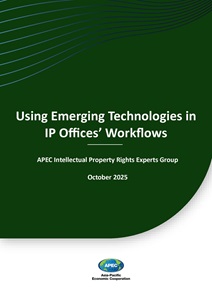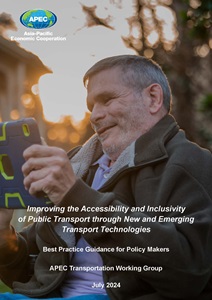
Reports
Using Emerging Technologies in IP Offices’ Workflows
The Asia-Pacific Economic Cooperation (APEC) is a regional economic forum established in 1989 to leverage the growing interdependence of the Asia-Pacific.
The Asia-Pacific Economic Cooperation (APEC) is a regional economic forum established in 1989 to leverage the growing interdependence of the Asia-Pacific.
APEC ensures that goods, services, investment and people move easily across borders. Members facilitate this trade through faster customs procedures at borders; more favorable business climates behind the border; and aligning regulations and standards across the region.
APEC ensures that goods, services, investment and people move easily across borders. Members facilitate this trade through faster customs procedures at borders; more favorable business climates behind the border; and aligning regulations and standards across the region.
APEC works to help all residents of the Asia-Pacific participate in the growing economy.
APEC works to help all residents of the Asia-Pacific participate in the growing economy.
Capacity building projects play an important role in helping translate APEC's goals into reality.
Capacity building projects play an important role in helping translate APEC's goals into reality.

Reports
•July 2024
Download Report
2MB
Published Under
SOM Steering Committee on Economic and Technical Cooperation (SCE), Transportation Working Group (TPTWG)
Accessed
2442
Pages
46
This report champions accessible and affordable transportation for all. Reliable mobility unlocks economic and social opportunities, especially for the 1.3 billion people with disabilities. New technologies offer exciting possibilities to overcome these mobility barriers. Through case studies the report highlights the challenges faced by people with disabilities and the potential of new technologies to improve their mobility. Technologies like navigation apps, smart glasses, and automated wheelchairs can significantly enhance accessibility, but affordability remains a hurdle. Drawing on best practices, the report offers guidance for incorporating these technologies into transport policies. Using five key focus areas it aims to create a shared understanding of the barriers and provide principles to guide government policy development. This document is intended to be used as a starting point for international collaboration between member economies of APEC in improving accessibility and inclusion in transport using assistive technology.

